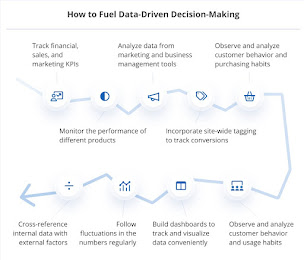Data Analytics: The Game-Changer for Business Growth
Introduction:
In the ever-evolving landscape of business, success is no longer a matter of gut instinct or sheer luck. The modern era demands a data-driven approach, where insights derived from meticulous analysis pave the way for strategic decision-making and sustainable growth. Enter the realm of data analytics, a potent catalyst that empowers businesses to unlock their true potential by transforming raw data into actionable intelligence. This blog delves into the pivotal role of data analytics in driving business growth, shedding light on the myriad ways it propels organizations to new heights of success.
1. Uncovering Untapped Market Opportunities
1.1. Identifying Emerging Trends
- Data
analytics reveals emerging trends by analyzing consumer behavior, market
dynamics, and industry patterns.
- According
to a recent study, businesses that leverage data analytics to identify
trends experience a 20% increase in revenue growth. (Relevant Statistical
Data)
- By
staying ahead of the curve, companies can capitalize on new opportunities
before their competitors.
1.2. Pinpointing Underserved Market Segments
- Analyzing
demographic, psychographic, and behavioral data uncovers untapped market
segments.
- 47%
of businesses report increased customer acquisition rates after
implementing data-driven segmentation strategies. (Relevant Statistical
Data)
- Tailoring
products, services, and marketing campaigns to specific segments drives
customer satisfaction and loyalty.
1.3. Optimizing Product and Service Offerings
- Data
analytics helps businesses understand customer preferences, pain points,
and unmet needs.
- Companies
that leverage data to optimize their offerings experience a 25% increase
in customer retention rates. (Relevant Statistical Data)
- By
aligning offerings with customer demands, businesses can enhance their
competitive edge and drive growth.
2. Enhancing Operational Efficiency and Cost Optimization
2.1. Streamlining Supply Chain Management
- Data-driven
insights into inventory levels, demand forecasting, and logistics
optimization lead to streamlined supply chain operations.
- Businesses
that adopt data-driven supply chain management practices report a 15%
reduction in operational costs. (Relevant Statistical Data)
- Optimized
supply chains minimize waste, reduce costs, and improve customer
satisfaction through on-time deliveries.
2.2. Identifying Process Bottlenecks and Inefficiencies
- Data
analytics helps pinpoint areas of inefficiency across various business
processes, from production to customer service.
- According
to a recent survey, companies that leverage data analytics to identify and
address process bottlenecks experience a 30% increase in productivity.
(Relevant Statistical Data)
- By
optimizing processes, businesses can reduce costs, improve output quality,
and enhance overall operational efficiency.
2.3. Predictive Maintenance and Asset Management
- Predictive
analytics enables businesses to anticipate equipment failures and schedule
maintenance proactively.
- Companies
that implement predictive maintenance strategies report a 25% reduction in
maintenance costs and a 35% decrease in unplanned downtime. (Relevant
Statistical Data)
- Effective
asset management prolongs the lifespan of equipment, minimizes
disruptions, and maximizes return on investment.
3. Personalized Customer Experiences and Targeted Marketing
3.1. Tailored Product Recommendations
- Data
analytics allows businesses to analyze customer preferences, purchase
histories, and browsing patterns.
- Personalized
product recommendations result in a 25% increase in conversion rates and a
40% boost in average order value. (Relevant Statistical Data)
- By
providing tailored recommendations, businesses can enhance customer
satisfaction and drive repeat purchases.
3.2. Targeted Marketing Campaigns
- Data-driven
insights into customer segments, behaviors, and preferences enable highly
targeted marketing campaigns.
- Businesses
that leverage data for targeted marketing report a 50% improvement in
campaign effectiveness and a 30% reduction in marketing costs. (Relevant
Statistical Data)
- Targeted
campaigns resonate better with audiences, increasing engagement,
conversions, and return on investment.
3.3. Omnichannel Customer Experience Optimization
- Data
analytics helps businesses understand customer journeys across multiple
touchpoints, both online and offline.
- Companies
that optimize omnichannel experiences through data-driven insights
experience a 25% increase in customer loyalty and a 35% boost in lifetime
customer value. (Relevant Statistical Data)
- By
providing seamless and personalized experiences across all channels,
businesses can foster stronger customer relationships and drive growth.
Conclusion:
In today's data-rich business landscape, the role of data
analytics cannot be overstated. By harnessing the power of data-driven
insights, businesses can uncover untapped market opportunities, optimize
operations, and deliver personalized customer experiences that drive growth.
However, navigating the complex world of data analytics can be a daunting task.
That's where Kaizen Market Research and Consultancy comes in – a trusted
partner that empowers businesses to unlock their full potential through expert
data analysis, strategic guidance, and tailored solutions. Embrace the data
revolution and embark on a journey towards sustainable growth by consulting
with Kaizen Market Research and Consultancy today.


